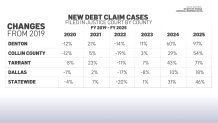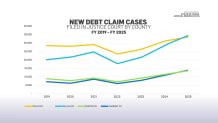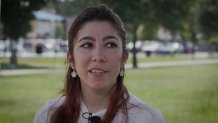Much of North Texas radiates prosperity, with sparkling new suburban neighborhoods, luxury cars, designer labels, and soaring high rises. But new data suggests cracks in the shiny facade and that there’s a bigger “Big D” in Dallas-Fort Worth: debt.
NBC 5 Investigates is diving deep into the financial squeeze, uncovering what’s behind the rising costs of living in North Texas and revealing how more and more people are struggling to climb out from under crushing debt.

Edward Ayala, NBC 5 Investigates
Edward Ayala, NBC 5 Investigates
Kathryn Arnold, who leads a DFW non-profit credit counseling service, sees more DFW consumers using credit cards to cover day-to-day expenses like groceries.
A credit counselor who spoke with NBC 5 Investigates said they’re seeing a need for their services at levels not seen since the COVID-19 pandemic, and that more families are using credit cards to cover daily expenses.
“They’re having to choose, do I pay for housing or do I pay for food for my family. That’s a tough place to be”, said Kathryn Arnold, CEO at Pathfinders, a DFW nonprofit credit counseling service that helps clients dealing with debt.
With an increase in outstanding debt, there’s a corresponding increase in debt collection lawsuits.

NBC 5 Investigates has been crunching the numbers, examining debt lawsuits in justice of the peace courts across our four major counties: Collin, Dallas, Denton, and Tarrant. Since 2019, there’s been a 54% increase in Collin County, a 97% increase in Denton County and a 71% increase in Tarrant County, where a record 34,500 debt claims were filed in justice of the peace courts in 2024 alone.
Evictions have also spiked. In Dallas County, more than 32,000 eviction cases have been filed in less than a year, with the numbers increasing in recent months.
It’s a grim picture, and emerging signs suggest that even more North Texas families are falling behind.

Chip Lupo is an analyst at Wallet Hub, a personal finance company. Lupo’s team recently published an eye-popping report showing the Metroplex is feeling the pain more harshly than others. They analyzed credit account data from millions of WalletHub users and then scored U.S. cities based on the number of individuals with multiple accounts in collections. That’s where people have missed payments, and debt collectors are after them.
They then weighted the rankings based on how quickly the accounts and balances were growing.
The three cities that scored worst in the country are in the DFW area: Garland, Fort Worth, and Arlington. Two other North Texas cities, Plano and Dallas, were among the 10 worst.
So why are half of the worst cities in the country for carrying debt in North Texas? Surging growth and the high cost of living are leaving DFW residents financially strained, Lupo said, adding that the cost of living in the Metroplex is quite high, driven primarily by skyrocketing real estate prices.

Edward Ayala, NBC 5 Investigates
Edward Ayala, NBC 5 Investigates
A report from Chip Lupo’s team at Wallet Hub showed three of the cities that scored the worst on an analysis of credit data were in North Texas.
Over the last 10 years, nearly 1.5 million people have moved to DFW, driving up housing costs, including mortgages, rent, property taxes, insurance, and maintenance. That leaves less in the bank for things like food, where prices have soared, too.
“If you look at how much Dallas has just grown in the last 20 to 30 years, how much more growth can you take on without it starting to have an economic effect?” Lupo asked. He said that a higher cost of living has pushed more people to use credit cards, not for luxury items, but for everyday things like groceries.
“It’s a pretty dire situation right now,” Lupo said. “If something doesn’t give, then you’re gonna see some serious problems.”
Families told us they’re making huge monthly payments, but it’ll take decades to pay off their balances with the current interest rates.

Edward Ayala, NBC 5 Investigates
Edward Ayala, NBC 5 Investigates
Pamela Reyes said she expects to be in debt for decades trying to pay off credit card balances.
Pamela Reyes said she has accepted that she will be in debt for years. Reyes said she previously had a good job with one of DFW’s largest employers, but her job was eliminated when her company downsized during the pandemic. She said she found another job, but it paid a lot less than her previous one. Reyes said health problems then forced her to leave that job, and she turned to credit cards to cover her monthly bills so she wouldn’t fall behind on her mortgage.
With soaring interest rates, Reyes’s credit card balances swelled, and soon she’d piled up $50,000 in debt.
“My family doesn’t know about how much debt I’m in,” Reyes said. “There’s shame associated with it. Like, just thinking of almost, like, I couldn’t do enough, even though I know that’s not true.”
Reyes is sharing her story now so that others in her position know they’re not alone. She also wants them to hold on to hope despite the huge challenge of clearing her debt.
“One of my credit cards, I’m making $415 payment every month, and only about $100 or so goes toward the actual principal, and the rest of it is interest,” Reyes said.

She’s now working with a credit counselor who is negotiating with her creditors to reduce balances and adjust payment dates. She’s also using her retirement savings to ensure she can make payments on time, thereby avoiding her account from falling into collections. So far, she has been able to avoid missed payments, she said.
In the WalletHub study looking at missed payments, cities were evaluated based on the number of collection accounts per person, rather than the amount owed. In Garland and Fort Worth, the average person with an account in collections had at least three accounts where bill collectors were after them.
“It’s the rate in which these accounts are going into collections that’s staggering,” Lupo said.
The Wallet Hub study found that, although families in North Texas had more accounts in collection, their past-due amounts had lower balances compared to people living on the coasts. But analysts said the rise in the number of overdue accounts could be a serious warning sign.
Credit counselors who work with clients nationwide told NBC 5 Investigates they’re detecting trouble in the DFW area.

Edward Ayala, NBC 5 Investigates
Edward Ayala, NBC 5 Investigates
Emanuel Rivero said people living in higher cost Texas metro areas, like Dallas-Fort Worth, seem to be more likely to have delinquent accounts.
Emanuel Rivero, with Money Management International, said lately his company is working with more people in DFW who are 30 or 60 days past due on their debts.
“I think one of the things that we’re seeing, specifically in Texas, is that the closer you are to a major metro, the more likely you are to have delinquency in your accounts,” Rivero said. “And we think that that has a lot to do with, unfortunately, the area that they live in and that sometimes things cost a little bit more money in those major metros.”
Debt is piling up in a place that, for decades before, was known as a destination for affordable living. As people flee the coasts, lured to Texas by the promise of great jobs and low expenses, they learn the savings aren’t always there.
“This is not a cheap place anymore,” said Reyes.

Edward Ayala, NBC 5 Investigates
Edward Ayala, NBC 5 Investigates
Kenneth Mohammed said rising costs and state policies can make it even harder for people to recover from a financial hardship.
When families fall behind in North Texas, some financial counselors told us that Texas has become a place where it’s often harder to bounce back due to rising costs and laws that favor creditors and landlords.
“What’s happening in Dallas-Fort Worth, and Texas, the state of Texas altogether is kind of a perfect storm,” said Kenneth Mohammed, director of counseling with American Consumer Credit Counseling.
In the weeks ahead, we’ll ask if Texas laws make things tougher for families in crisis.
Where are rising prices impacting you the most? How is debt impacting your family, friends and neighbors? We want to hear from you. As our series continues, we’ll investigate what’s driving the affordability crisis and whether changes can be made to keep more families from falling deeper into debt.
We want to help provide solutions. Thursday, November 6th at 6 p.m., NBC 5 Responds’ Diana Zoga will share the essential guide for families on what to do if a friend or family member is falling behind or in danger of falling behind. Those next steps can be significant.
Need financial help?
Pathfinders
https://www.pathfinderstc.org/
6550 Camp Bowie Boulevard, Suite 111
Fort Worth, TX 76116
Phone: 817-731-1173
info@pathfinderstc.org
Legal Aid of NorthWest Texas
https://legalaidtx.org/
600 East Weatherford Street
Fort Worth, TX 76102
817-336-3943
Money Management International
https://www.moneymanagement.org/
American Consumer Credit Counseling
www.consumercredit.com
2025-2026 REFERRAL DIRECTORY
Legal services and other resources for low-income Texans
https://www.texasbar.com/
